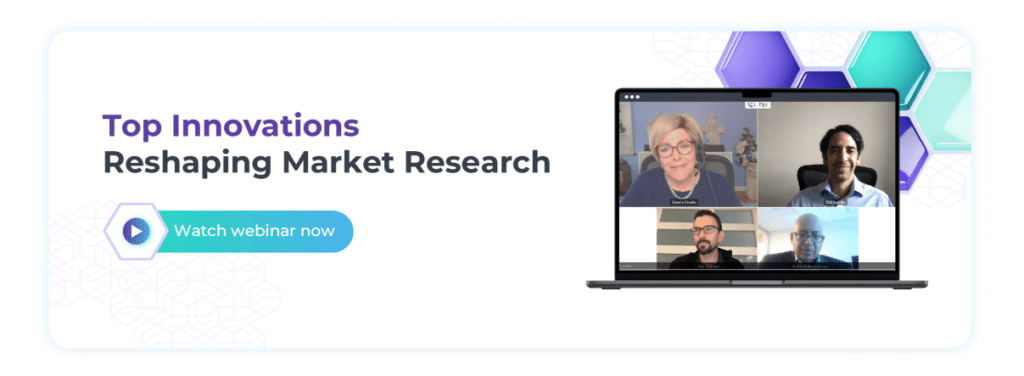The market research landscape is evolving rapidly, and a recent webinar hosted by Apollo Intelligence, “Top Innovations Reshaping Market Research,” highlighted the cutting-edge advancements driving this transformation. Our distinguished panel of experts delved into the latest innovative approaches revolutionizing the field.

In the dynamic world of healthcare market research, integrating traditional statistical analytics and advanced machine learning (ML) algorithms is a game-changer. This symbiotic relationship redefines how we understand physician and patient behavior and the intricate nuances of healthcare data. Here’s a deep dive into the transformative potential of ML and AI in market research and why healthcare market research organizations and agencies should pay close attention.
The Role of Machine Learning in Market Research
Machine learning algorithms are adept at identifying patterns and predicting outcomes from complex datasets. These capabilities can be harnessed in healthcare to gain deeper insights into patient behaviors and physician decision-making processes. By leveraging ML to understand feature importance, market researchers can pinpoint the key drivers behind specific healthcare outcomes, thus enabling more targeted and effective interventions.
Integrating Diverse Data Sources
One of the most significant advancements in market research is the ability to integrate ML insights with other data sources, such as claims data or electronic health records (EHR). This integration enriches the research, providing a more comprehensive view of the healthcare landscape. For instance, social determinants of health (SDOH) datasets, when combined with clinical data, can offer valuable context to the “what” and “why” of healthcare trends. Insights and analytics professionals are increasingly finding innovative ways to connect these diverse datasets, enhancing the relevance and accuracy of their findings.
Navigate the AI Landscape
AI’s journey is long and evolving, with each phase revealing new applications and improvements. For market researchers, the early adoption of AI tools should focus on the low-hanging fruits—applications where AI can deliver clear and immediate benefits. For instance, it is a powerful use case for large language models (LLMs). These models can efficiently distill vast qualitative and quantitative data, providing concise and actionable insights.
Enhance Productivity with AI
Generative AI tools are rapidly advancing, offering new capabilities to enhance productivity and add efficiencies and value to human researchers. LLMs, for example, excel at summarizing information from qualitative transcripts or structured interviews. This capability allows market researchers to quickly process and interpret large volumes of data, thereby speeding up the research cycle and delivering insights more efficiently.
Challenges and Opportunities
One of the biggest challenges for market research today is managing the vast amounts of unstructured data generated during research. We need to be cautious of whether the volume of data we’re creating answers the questions that need to be asked to inform brand strategies. AI can help by framing business problems more intelligently and integrating responses to deliver deeper, coherent insights.
The Future of AI in Market Research
AI promises to transform market research into a more strategic and integral component of pharmaceutical decision-making. By enabling near real-time access to insights, AI tools can shorten the turnaround time for research projects from weeks or months to almost instantaneously. This real-time capability allows market researchers to stream continuous insights back to key decision-makers, linking these insights to real-world data streams and answering questions in real time.
Embracing the Human Element
While AI offers remarkable efficiency and effectiveness, the human element remains indispensable. Market researchers must ensure that AI-generated insights are accurately interpreted and strategically applied. The role of insights professionals will increasingly shift from data generation to data interpretation, ensuring that the right questions are asked and the most relevant insights are highlighted.
Case Studies and Success Stories
Real-world applications of AI in market research are already showing promising results. For instance, Apollo Intelligence implemented machine learning tools to optimize physician participation in market research studies. The results were a 70% reduction in outbound invites and a 30% reduction in field time. There was also a significant improvement in the physician’s experience and engagement.
Conclusion
Integrating AI and ML in healthcare market research is not just a technological advancement but a paradigm shift. By embracing these tools, market research organizations can deliver more accurate, timely, and actionable insights. However, this journey requires carefully leveraging AI’s capabilities while preserving human researchers’ invaluable expertise and intuition. As we navigate this evolving landscape, the collaboration between AI and human insights will shape the future of healthcare market research, driving innovation and improving outcomes.
For more context and a complete discussion, watch the webinar today.




